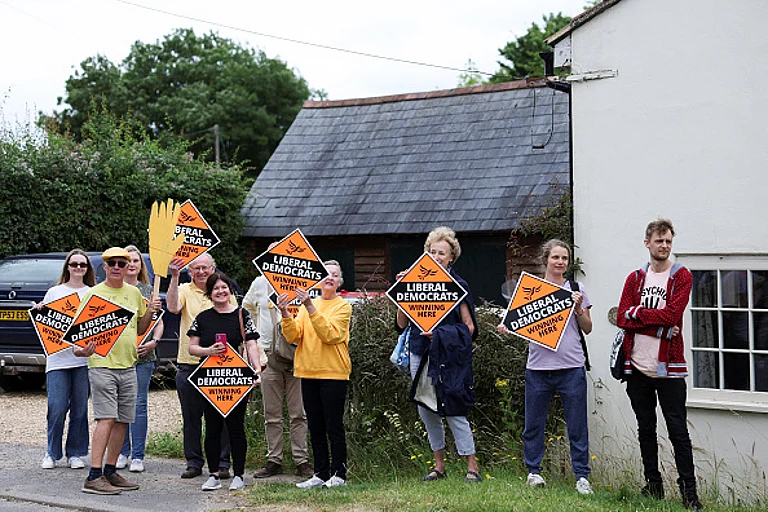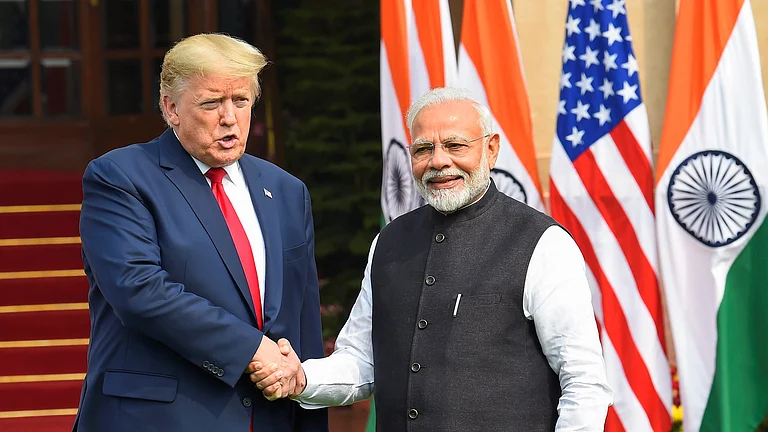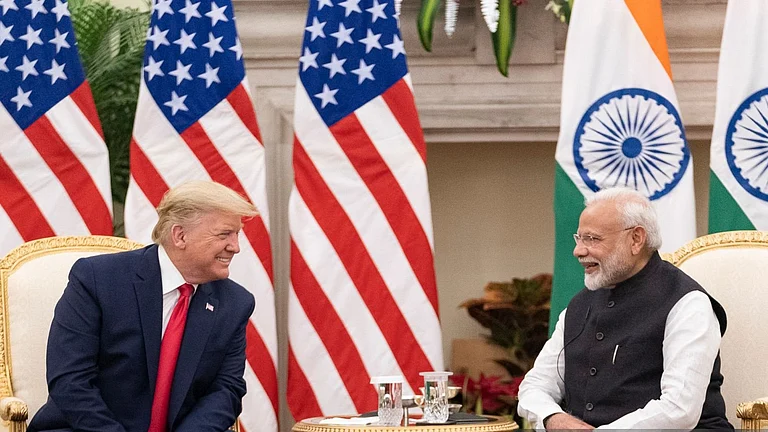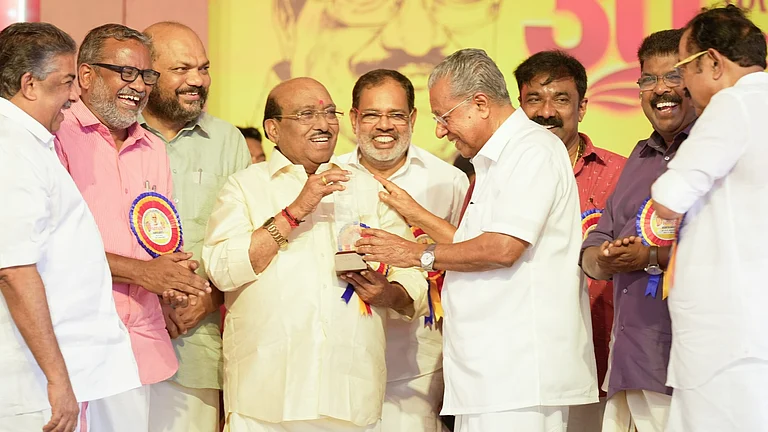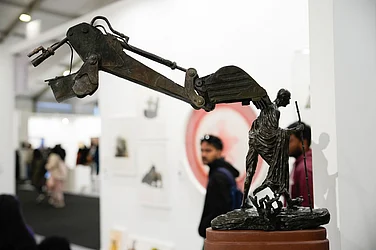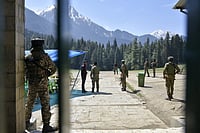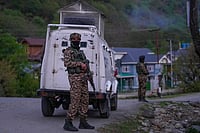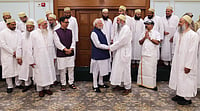Ahead of the July 4th election results, 70 British-Hindu organisations have banded together under the broader title: Hindus for Democracy (HFD). A socio-political organisation, HFD’s slogan reads ‘voting is not just our right but our Dharma.’ In its manifesto, HFD states that “Hindus form a strong pillar” of UK, and puts forth “expectations and aspirations from politicians seeking support from this sizeable community.”
The manifesto demands protection of Hindu temples, concession for dependant visas of elderly parents and those for Hindu priests. It also calls for anti-Hindu crimes to be considered a religious hate crime over and above the bounds of UK’s 2006 Racial and Religious Hatred Act. Many British lawmakers, across party lines, have endorsed the manifesto, with 19 out of 27 endorsements being from members of the Conservative party.
According to British journalist and researcher Sam Bidwell, members of the HFD are closely aligned with the BJP and the organisation is housed in a building belonging to a BJP supporter. HFD’s office is located in a building owned by Vascroft Contractors, a firm owned by Shashi Vekaria and his son Mitesh Vekaria. Vascroft is a construction firm that works on projects across the commercial, social housing and residential sectors. One of its earliest proposals, a Shree Swaminaryan Temple, became a reality in 2018 in Willsden, London. According to Bidwell, Vascroft helped organise Modi’s maiden visit to the UK and his address to the Indian community at Wembley Stadium in 2015.
HUD’s website lays out a detailed process for politicians to endorse the manifesto, involving uploading on social media their pictures holding the document, and using the hashtag: #SupportingHinduManifesto2024. In June, a candidate from the Conservative party, Ameet Jogia came under fire for his public endorsement posts on X and Instagram.
While UK is home to an Indian diaspora that is two million strong, British-Indians make up less than two per cent of the total population of England and Wales. In some constituencies, however, Hindu British-Indians are a dominant minority, making up 25 to 30 per cent of the population. Jogia, for example, is running from Hendon, in which Indians make up the largest minority population at 17 per cent. In other constituencies like Leicester East (37.6 per cent), Harrow East (28 per cent) and Brent West (28.3 per cent), more candidates may find that the sectarist appeal is hard to ignore, says Bidwell who collated the data on vote share.
Bidwell added that HFD’s Hindu manifesto takes inspiration from Muslim and Jewish minorities who have traditionally released such statements ahead of the elections. “The British Hindus are asking why can’t we have the same benefits and privileges as the other minorities,” he said.
The UK has experienced a vast demographic shift since 2019; the number of ethnically diverse communities has grown in proportion to its Caucasian population. The country’s 2021 Census showed that the total Caucasian population was 81.7 per cent, nearly a five per cent decrease from 86 per cent in 2011. Meanwhile, the share of minorities in the population increased to 18 per cent from 13.8 per cent ten years ago.
Faced with a shift in demographics, political parties see a greater appeal in reaching out to the ethnic communities, Bidwell remarked. “Until the 1990s UK’s population was homogeneous and immigrants were only a small feature. However in the last two decades we have seen a massive demographic changes with more ethnically diverse population. Although the overall number of ethnic population is small compared to the native population, they command significant number in certain constituencies.”
The rush among political parties to appeal to Hindu voters began in 2016 during the London mayoral elections. Conservative candidate Zac Goldsmith targeted Indian voters, warning them against voting for Labour candidate Sadiq Khan. Goldsmith released a leaflet during the campaign, with his photo alongside Prime Minister Modi, saying that a vote for Khan could put their family jewellery at risk as he vowed to push for a new tax on family heirlooms.
Although Goldsmith failed to garner enough votes to defeat Khan, with British-Indians shifting their allegiance from Labour to Tories, more Conservative candidates are seeing the utility of Hindu voters. Earlier, it was taken for granted that the overwhelming majority of the British Indians would vote for the Labour. This is not the case anymore, says Anand Menon, professor of European Politics and Foreign Affairs at the Kings College, London.
The left-leaning Labour Party’s stress on social justice and human rights was the obvious choice for first and second-generation immigrant families, including British-Indians. However, Labour’s partisan politics, perceived pro-Pakistan position on the Kashmir conflict under Jeremy Corbyn’s leadership alienated many sections of the British-Indian supporters. The 2023 attack on the Indian High Commission left the Indian community at large with the belief the Labour Party was not standing with them.
The Hindu community, represented by an umbrella organisation Hindu Forum of Britain and believed to be closer to the traditionalist Congress’s secular ideology, split and formed Hindus for Democracy to voice its opposition against Labour’s apathy towards Indian interests. The British-Hindus, strong supporters of Modi’s nationalist foreign and domestic policy in India, galvanised to call out Corbyn on his frequent criticism of the Modi government and its crackdown in Indian-administered Kashmir.
Kuldeep Singh Shekhawat, President of the UK chapter of Overseas Friends of BJP (OFBJP), ran an anti-Labour campaign during UK’s 2019 General Election. Shekhawat is also a director at one the longest running Asian channels in Europe Midlands Asian TV. He mobilised the Indian community, particularly Hindus, through a WhatsApp campaign and networked with temples to swing the vote in favour of the Conservatives.
Since BJP’s 2014 win, OFBJP has aggressively campaigned in support of the Conservatives. Most recently, Shekhawat was seen campaigning for Bob Blackman, the Tory candidate from Harrow East. He also invited former BJP minister Smriti Irani to celebrate the third regime of the Modi government.
Menon observed a growing division along religious lines among UK’s ethnic minority communities, which in turn is leading political parties to appeal to voters on sectarian lines. “Ethnic minorities are increasingly seen as up for grabs to influence electoral outcomes and the release of the Hindu manifesto should be seen in this context,” he said.
Menon noted that British Hindus were more confident in asserting their ethnic pride and identity since the BJP came to power. In 2022, for example, British-Hindu and Muslim communities in Leicester clashed leading to violence, and communal tensions for weeks. British-Hindus see India as a rising power under Modi’s leadership and want to make themselves count in the UK elections. Bidwell also sees connections between Modi’s Hindutva politics in India and the rising influence of the Hindu diaspora in the UK.
The British-Hindu community is only the latest entrant to exert its political influence during elections. However, Bidwell warned that, “sectarian appeal turns politics into a zero-sum game” making it unhealthy for UK’s democracy. “It incentivises ethnic communities to compete with others for resources and protect their vested interests. Instead of building broad coalitions, it feeds into the far-right narratives that minorities cannot integrate and co-exist with others and need special concessions,” he added.
It remains to be seen whether HFD’s manifesto gets any results post-elections. One thing is certain: with a record number of British-Indians expected to enter Parliament this year, and Rishi Sunak poised to hold on to his seat in North England, the Indian influence on Great Britain is here to stay.







